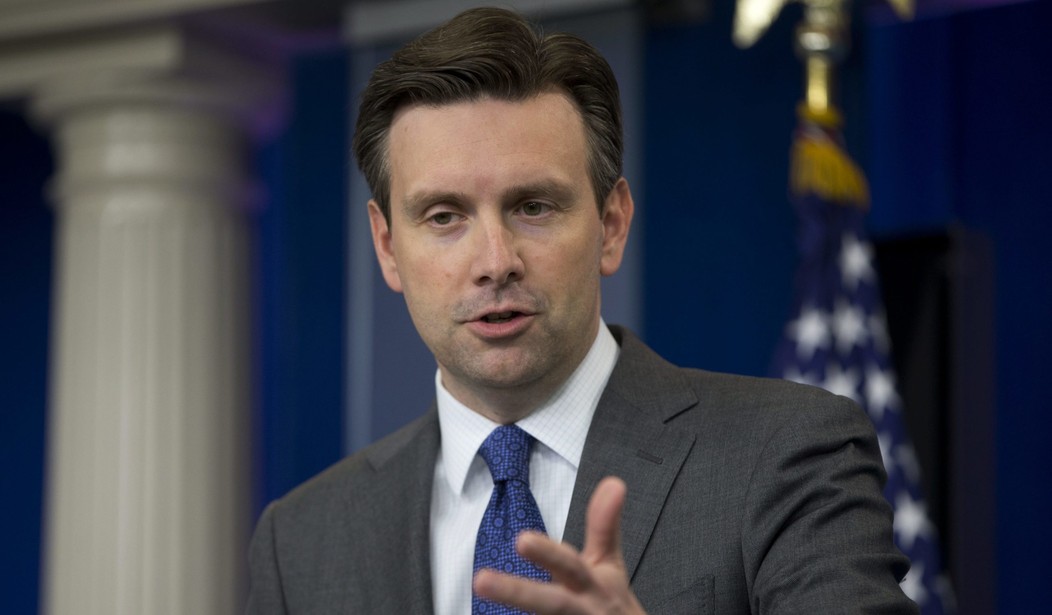The White House finally acknowledged that former Secretary of State Hillary Clinton is under criminal investigation — an inconvenient fact the Clinton camp continues to deny, calling it a “security review” instead.
Press Secretary Josh Earnest made the admission during the daily White House press briefing in answer to a question posed by Fox News’ James Rosen about the propriety of the president’s endorsement of Clinton.
“Previously the president has used one public forum or another to comment on the FBI investigation into Mrs. Clinton and her e-mail conduct,” said Rosen. “At one point he stated that as far as he could see there was no damage done to national security. You, yourself, from this podium have suggested that the investigation wasn’t trending toward any focus on Mrs. Clinton herself. I wonder if you could address for us the potential conflict of interest that might exist when the president of the United States, the head of the executive branch, is openly saying ‘I want this woman to succeed me in the Oval Office’ and you have other employees of the executive branch, career prosecutors, FBI agents working this case who have now just heard how the president wants to see this case resolved in essence. Isn’t there some conflict there?”
Earnest replied, “James, there’s not. You noted instances where the president was asked about the FBI investigations. And in each of those answers the president made clear that that is being conducted independent of any sort of political interference. That is a principle that the president is resolutely committed.”
Josh Earnest said that the reason the president felt confident to make the endorsement was because “he knows the people who are conducting the investigation aren’t going to be swayed by any sort of political interference. They aren’t going to be swayed by political forces. They know that their investigation should be guided by the facts and that they should follow the evidence where it leads. The president has complete confidence that that’s exactly what they’ll do.”
Rosen pressed, “So when a career prosecutor or an FBI agent working on the Clinton investigation hears this president speak openly about how he wants Hillary Clinton to succeed him, you don’t think that that career prosecutor or that FBI agent takes that as some indication as to how the president wants to see this case resolved?”
Earnest said that the “career prosecutors understand that they have job to do, and that that job they are supposed to do — which is to follow the facts, to pursue the evidence to a logical conclusion.”
He continued, “That’s a job that they are responsible for doing without any sort of political interference. And the president expects them to do that job, this is the reason that we actually ask career federal prosecutors to take the lead on these kinds of matters. They don’t have political jobs. They have career jobs as law enforcement officers and as prosecutors and investigators. That’s what their responsibility is. And that’s why the president when discussing this issue in each stage has reiterated his commitment to this principle that any criminal investigation should be conducted independent of any sort of political interference and that people should be treated the same way before the law regardless of their political influence, regardless of their political party, regardless of their political stature and regardless of what political figure has endorsed them.”
Rosen asked, “Has President Obama ever discussed the Department of Justice investigation with Mrs. Clinton?”
Earnest answered that “he has not.”
Separate from the question of the propriety of the president endorsing a candidate who is under investigation is the question of why the president would even want to, given the damage it could do to his own reputation and legacy. If the outcome of the investigation is not a forgone conclusion, there is a possibility that the Democrat presumptive nominee could be indicted for violating multiple criminal statutes. That would mean that Obama endorsed a criminal. A cautious and clever president could easily come up with an excuse not to endorse — chief among them the impropriety of such an endorsement. Yet as soon as she clinched the nomination, he endorsed Clinton. Why?
Obama was accused of undercutting the investigation last October and again in April when he improperly implied that Clinton had not broken any laws or damaged national security. He said this from the point of view of someone who is embroiled in the email scandal himself.
The State Department admitted back in February that 18 e-mails between Clinton and Obama have been identified, and the administration refused to release them because to do so would compromise “the president’s ability to receive unvarnished advice and counsel” from top government officials. Former federal prosecutor Andrew McCarthy wrote at National Review, “Not only is it obvious that President Obama knew Mrs. Clinton was conducting government business over her private e-mail account, the exchanges the president engaged in with his secretary of state over this unsecured system clearly involved sensitive issues of policy.”
A prosecution of Clinton might expose that Obama engaged in recklessness similar to Clinton’s, albeit on a far smaller scale. Moreover, Clinton would likely argue in her defense that the president, who is ultimately responsible for safeguarding classified information, not only authorized Clinton to use private e-mail but knowingly used it himself in order to communicate with Clinton.
There’s our foregone conclusion. Barack Obama — not Loretta Lynch — will be making the call whether or not to indict.









Join the conversation as a VIP Member